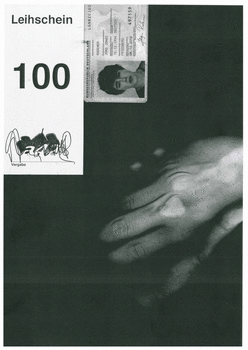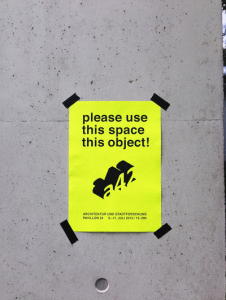- Typology
- Research
- Project
- a42.org XXX
- Partner
Chair for Architecture and Urban Studies
- Client
- year
- 2014 - 2017
- Location
- Nürnberg, Bayern, Deutschland
- Between 2014 and 2017 c/o now's Tobias Hönig serves as assistant professor at the Chair for Architecture and Urband Studies at the Academy of Fine Arts in Nuremberg.
- professor
- Arno Brandlhuber
- assistant professor
- Tobias Hönig
- lectureship
- Ulrich Gutmair, Hans-Bert Binz
- guest professorship
- Florian Hertweck (2014/15), Thomas Mayfried (2015) & Büro für Konstruktivismus (2015-17)
- students
- Anna Bogner, Eugenia Freund, Jakob Grelck, Martina Hanusova, Matthias Hoffmann, Fee Kyriakopoulos, Maja Lesnik, Johanna Maierski, Veljko Markovic, Cornelia Müller, Dennis Pohl, Kathrin Schömer, Daniel Spruth, Thomas Steinhöfer, Markus Streber
- special thanks
- Ute Grötsch, Constanze Boscher
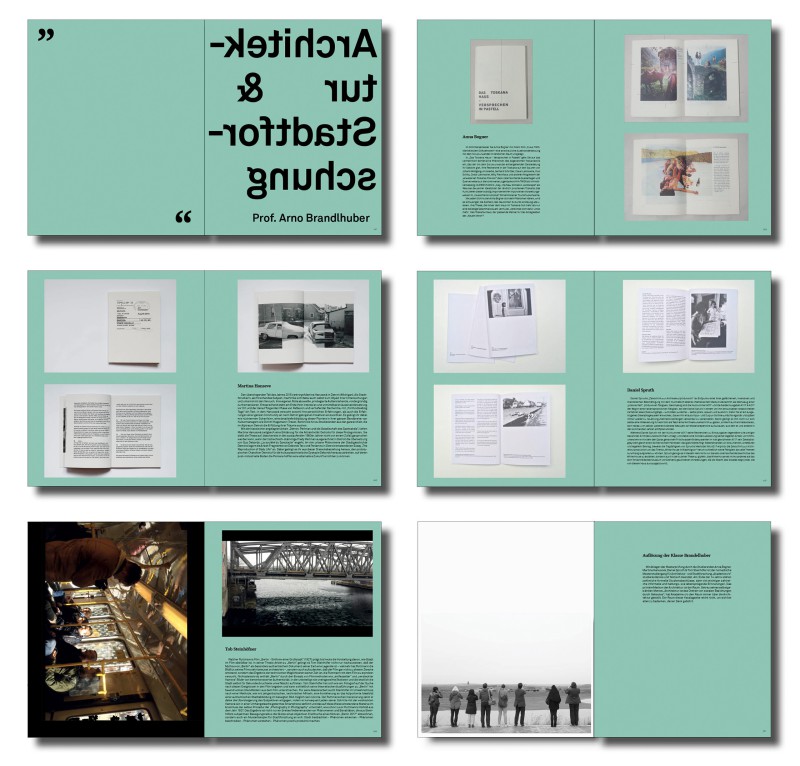 XXX
XXX
Fig.004The catalogue for the Academy of Fine Art’s annual exhibition 2017 features the last master theses of students of the Chair of Architecture and Urban Studies. The program ends after 14 years and says goodbye on its last catalogue-page: „Do you thin architecture is…? - No. - What? - No. - Do you think architecture is…? - No. No, I don’t: With the completion of the last master theses by the students Anna Bogner, Martina Hanusová, Daniel Spruth & Tom Steinhöfer, the nomadic master program for architecture and urban studies Akademie c/o is without students and de facto finished. At the end of 14 years there are numerous formal graduations, but much more important there are numerous informal attitude and life shaping memories. Architecture’s primary medium is space. Following its self-chosen devise 'architecture is the ordering of social relations through built structures', Academy c/o always preferred space to architecture. The space of this catalogue-page ist not enough to thank everyone whom thank is due.!
© Akademie der Bildenen Künste in Nürnberg
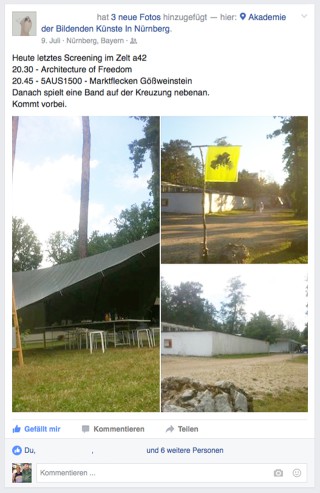 XXX
XXX
Fig.005The students announce the screening of the film „5 aus 1500“ by Anna Bogner on Facebook.
www.facebook.com
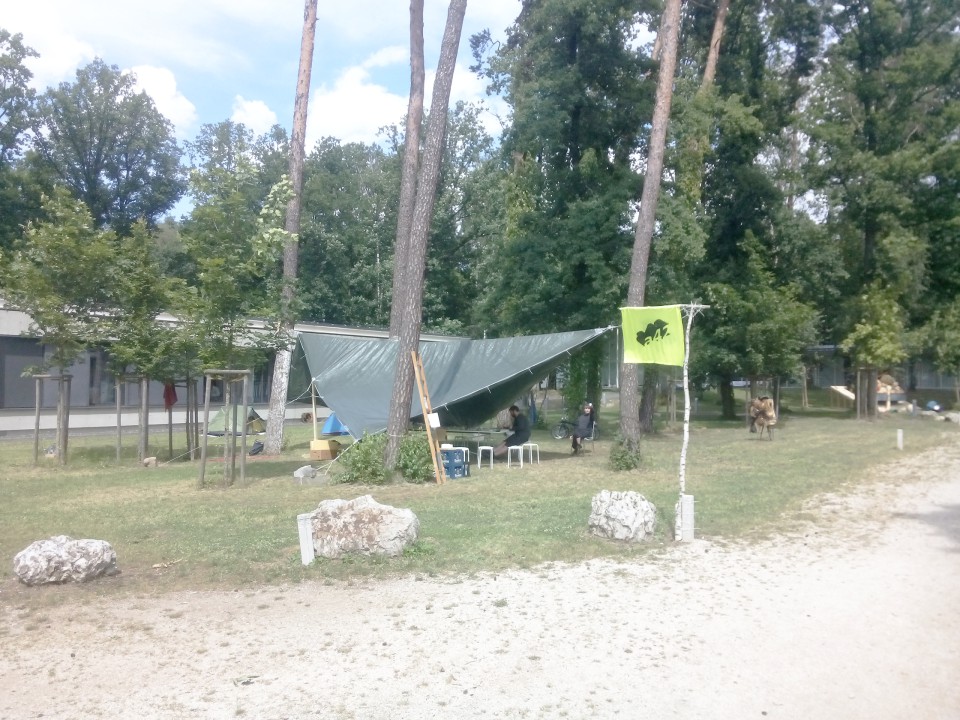 XXX
XXX
Fig.002After all rooms and items belonging to the study program were passed by Academy c/o to the students of the other classes in 2015, the program is, during the annual exhibition in 2016, for the first time fully nomadic guest on the campus of the academy. The class for architecture and urban studies resides between the new building an the buildings by Sep Ruf in a temporary camp in which the students sleep, live, work and in which they present their program for the annual exhibition.
© c/o now
![]() XXX
XXX
Fig.014© c/o now
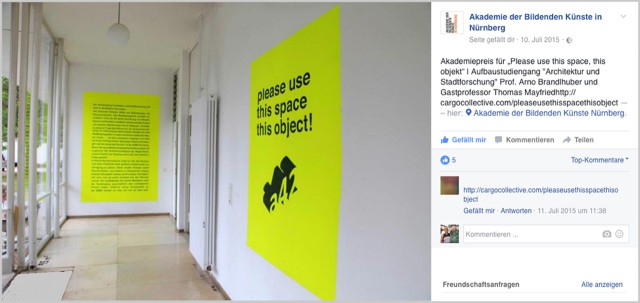 XXX
XXX
Fig.006© c/o now
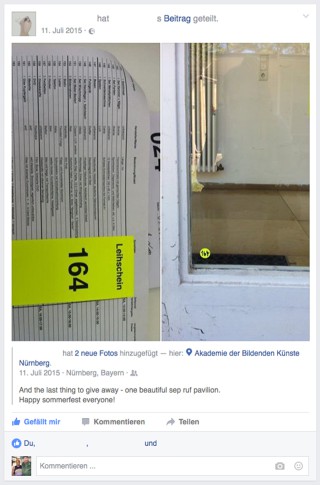 XXX
XXX
Fig.007© c/o now
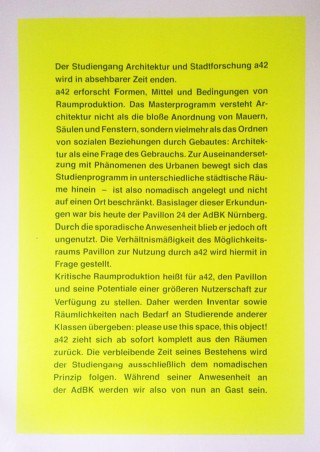 XXX
XXX
Fig.011© c/o now
![]() XXX
XXX
Fig.015© c/o now
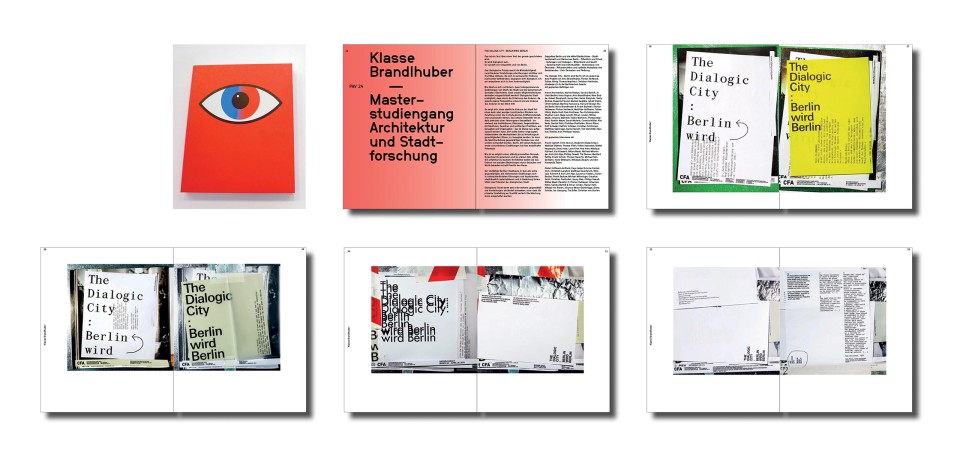 XXX
XXX
Fig.003Because all individual, as well as the collective project works, gather under the umbrella of The Dialogic City and therefore discuss Berlin-topics, the class’ contribution to the catalogue of the academy’s annual exhibition 2015 fully reflects that fact. The study program, together with its guest professor Thomas Mayfried, compiled a advertising campaign which should on the one hand outline the „in progress“-status of the project and on the other hand is meant to already generate attention with snippets from the research-material. Berlin-based gallery Contemporary Fine Arts (CFA) made its firm booked advertising spaces in the magazines Texte zur Kunst und Artforum available for the study program’s campaign. The catalogue features a mission statement on the project and shows a selection of advertisements.
© Akademie der Bildenen Künste in Nürnberg
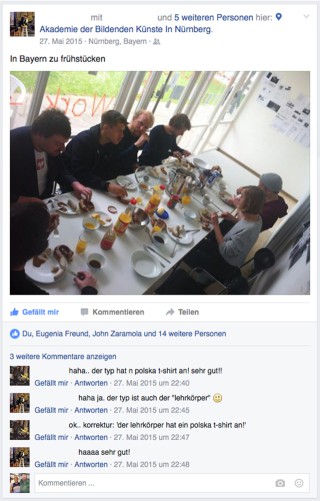 XXX
XXX
Fig.001Breakfast in Bavaria.
facebook
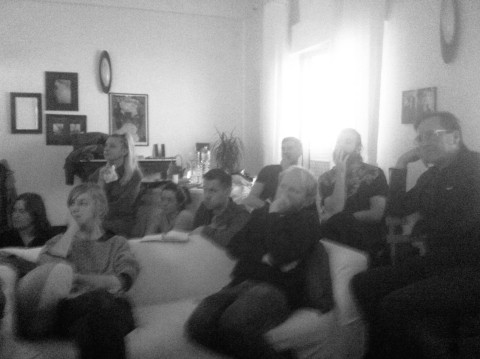 XXX
XXX
Fig.008At work in the Ungers-building in Nuova Gibellina.
© c/o now
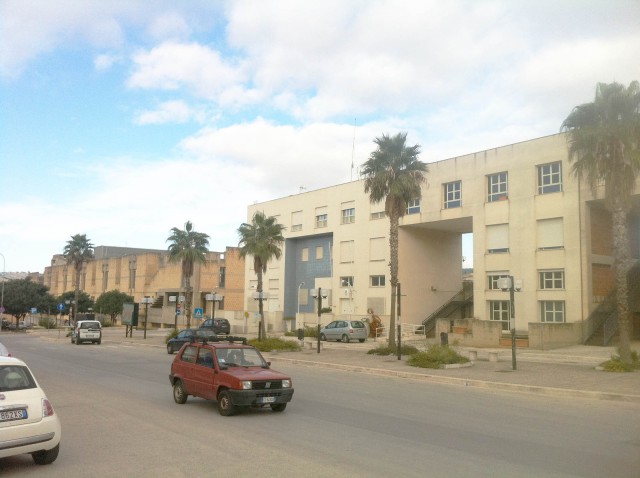 XXX
XXX
Fig.009Ungers in Nuova Gibellina?
© c/o now
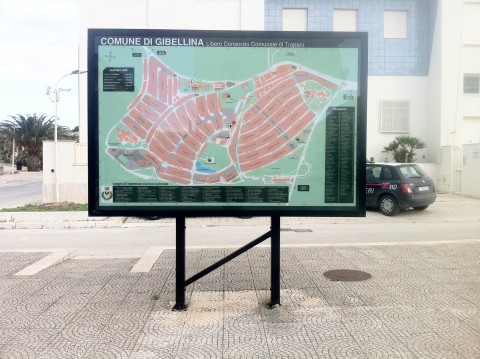 XXX
XXX
Fig.010© c/o now
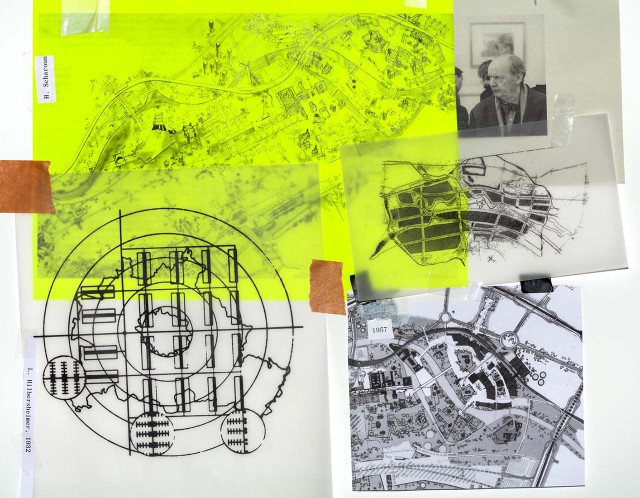 XXX
XXX
Fig.012© The Dialogic City
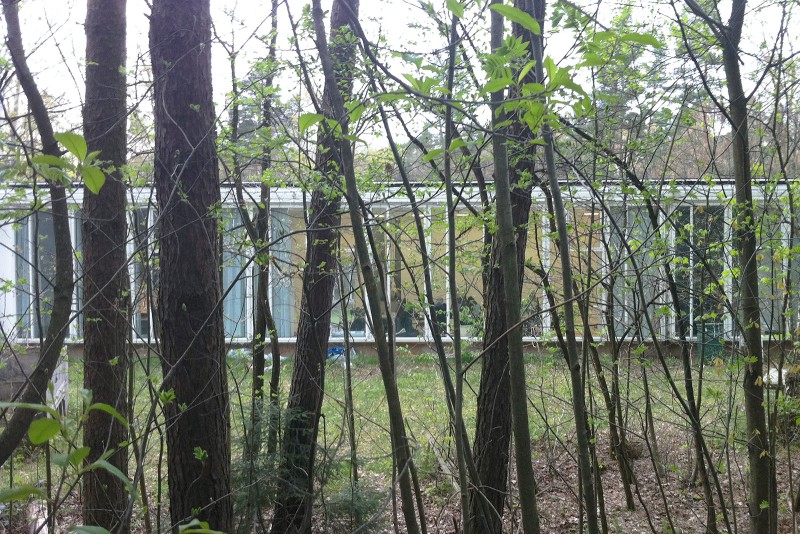 XXX
XXX
Fig.013© c/o now
The master program Akademie c/o researches patterns, methods and conditions of architectural production. “Architecture” is neither understood as an addition of walls, columns and windows, nor as an optimization of procedures for aesthetic, economic or constructive demands, but rather as “the ordering of social relations through built structures.” (Christian Posthofen) Architecture is a question of use, of not-building, why building or building for whom. The master program understands itself as a place for a continuous review of existing models of thought: Instead of teaching architectural conventions or technical skills, the program aims at questioning, revising, adjusting or confirming them. The objective of research-based studies is not the invention of a new kind of architecture, but an actualized efficacy of design concepts.
The Akademie c/o master program is participant-orientated with a flexible time-schedule. The participants focus on an individual subject, which is developed step by step, deepened in a written thesis and finally elaborated in a master project. The subjects as well as the form of realization can be chosen according to the participants own research interest. The program can be completed either in minimum two (full time) or maximum four years (part time). The program can be joined in the winter as well as in the summer semester. (The admission deadline however is only once a year, mid-May)
The Akademie c/o master program is spacially active. Each Semester is structured with 4-5 seminar blocks of, each 8-14 days. The locations (c/o) of the seminars change according to the requirements of the program, linking as closely as possible to the seminars content. Participation in the seminars is compulsory; the participants however are free to choose their place of residence.
The program is insofar directed towards participants looking for an opportunity to advance their practical-academic qualifications, without having to give up established working- and living environments.
The Akademie c/o master program is discoursive.
The program understands itself as an active participant and initiator of contemporary discourses. The concept of a spatially active academy addresses questions with concrete spatial situations but also allows for intensive co-operation and discussion between different initiatives, universities and other kinds of institutions. The integration of changing guest-professorships, a flexible modeling of seminars, lectures and other teaching assignments creates a proactive initiative.
